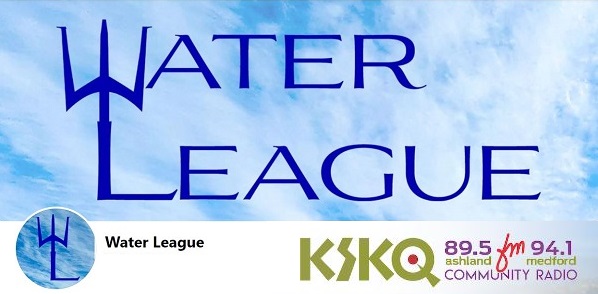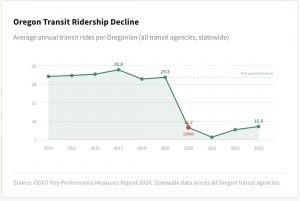Oregon praised for push to update water code in 2025
5 min read
The co-founder of Water League says Oregon needs to update its water laws, and he praised Gov. Kotek’s leadership.
Christopher Hall (Water League): This may be the most substantial reformation and modernization of Oregon’s water code in 70 years since 1955 when they modernized water policy and instituted the 1955 Ground Water Act.
[00:00:21] John Q: He made the remarks to Rick Vann of The Age of Adventure, on KSKQ Community Radio in Ashland and Medford.
[00:00:30] Christopher Hall (Water League): We think of like the Northwest having lots of rain and lots of rivers. And in Oregon, what we have is a number of rivers and aquifers that are overpumped. And we have water scarcity caused by 19th century and in some cases 20th-century water use policies that are effectively draining our future.
[00:00:54] I didn’t really fully understand it until I had been here for a number of years and started diving into the water use problems caused by organized crime syndicates in Southwest Oregon. And they showed up on the scene mostly in 2021. They were trickling in the year before and they almost quintupled the number of acres of cannabis production that had been stable for 70 years.
[00:01:23] As you know, in Southwest Oregon we have a proud history of 50-60-70 years of growing organic backyard mom-and-pop cannabis. And all of that got disrupted when these folks from Eastern Europe and mostly Northern California showed up on the scene and just treated our region like warlords, frankly, and they ended up pumping our streams dry.
[00:01:47] They were turning our creeks and streams into gravel roads. They were digging 30-foot holes with massive excavators to get to the water table and folks’ wells were going dry all over Southwest Oregon. And just in the Illinois Valley alone, we took a half-a-billion-gallon drink out of our little tiny watershed.
[00:02:09] And that’s when it occurred to me, like, because I did a lot of research and data and calculations and started to actually see what happens when too much pumping goes on.
[00:02:20] And I’m going to now open up to the whole state of Oregon. In the whole state of Oregon, 78% of the water that humans use and divert comes from streams and about 22% comes from the ground and from aquifers.
[00:02:34] And where does all that water go? Well, 78% of all the water, whether it’s groundwater or surface water, is used by irrigation and when you factor in stock watering and washing your tractor and other stuff like that, it’s about 85 or 86% of all water use in Oregon is for agriculture.
[00:02:54] And then you look at the domestic wells, there’s what? There’s 225,000 domestic wells. They use about 1% of the water. And then cities, which really house about 80% of Oregon’s population—Portland or Eugene or Ashland—all of the cities and municipalities that have public water supplies, they use about 9%.
[00:03:17] The numbers are quite amazing.
[00:03:20] I’ll take a moment here to mention that all water within the state of Oregon belongs to the public. And so the state has a duty, it’s called the public trust doctrine, and they have a duty to hold water in trust for the public. And the way they do that, well, they’ve got the water code, which is like, you know, a huge stack of laws.
[00:03:42] The water code in 1909 came as a result of serious concerns for overappropriating surface waters. They were concerned about having to deal with dewatering creeks and settling these bar fights among the miners and the agriculturalists and others who were using huge quantities of water.
[00:04:05] And so they ensconced this incredibly inequitable and regressive ideology called ‘prior appropriation,’ which also goes along the lines of seniority. And what it says is that whoever got to the river or the spigot first gets to use the water. And anybody who comes after them can go pound sand if there isn’t enough.
[00:04:31] I’m doing the research now, exploring how the doctrine of prior appropriation would be a derivative of the ‘Doctrine of Discovery.’ Because what the doctrine of prior appropriation is, is whoever got to that river first, they nailed onto a tree some scrawled note they could barely write and laid claim to that, just like they laid claim to mines or to land.
[00:04:52] And what happened is that nobody ever really asked them, ‘Well, what are you using the water for?’
[00:04:57] But finally, by 1909, the state had enough resources and had enough foresight to realize it had to get on top of this issue. And it did, and it wrote Oregon’s water code (I think it was really done well). And over the years they have, for the most part, been revising that.
[00:05:14] The 1955 Groundwater Act regulated groundwater, required you to get water rights for groundwater use that wasn’t just like for your domestic well. They started regulating groundwater the way they did surface water. And now 70 years later, they’re having to write administrative rules that basically make it very difficult to get new water rights in the state of Oregon.
[00:05:37] And that’s because just like the streams, we’ve overappropriated the groundwater. And now what’s happening in 2024 is that we have over appropriated groundwater in every basin in the state and so the state is effectively restricting new water rights to groundwater. So you can’t really get a water right anymore for groundwater because we’ve pumped too much.
[00:05:58] And what’s happening, however, is that cities which just use a tiny fraction of water are being punished for the sins of irrigation. And it’s the irrigators who drained Oregon. It is not the cities and yet cities that are being told along with irrigators, ‘You can’t get a water right.’
[00:06:14] And now that we’re experiencing water scarcity, ‘Whoever got to the stream first,’ really, it’s an absurd and illogical measuring stick for whether or not we should be using the water, right? We should be using the water for what are the highest and best uses because we just don’t have that much left of it.
[00:06:32] John Q: He praised Oregon’s leaders for their work to update the water laws.
[00:06:35] Christopher Hall (Water League): I would like to give a big callout to Gov. Tina Kotek. Her leadership has basically said, ‘The buck stops here,’ and she has called on the Oregon Legislature and other leaders in the state of Oregon to modernize Oregon’s water code in the 2025 long legislative session.
[00:06:56] The legislature has held initial scoping meetings both in the Senate and the House to review some basic plans that the governor has laid out. And in my view, they are visionary. And I am very pleased with statements by those in the governing capacity to say we take responsibility and we are going to fix this. And I just can’t say how pleased and proud I am of them and the work they’re going to do.
[00:07:28] John Q: Christopher Hall, co-founder of Water League, endorses modernizing Oregon’s water code in 2025. That’s from an interview with Rick Vann, for Age of Adventure on KSKQ. For more, visit KSKQ Community Radio, or the Water League website.






